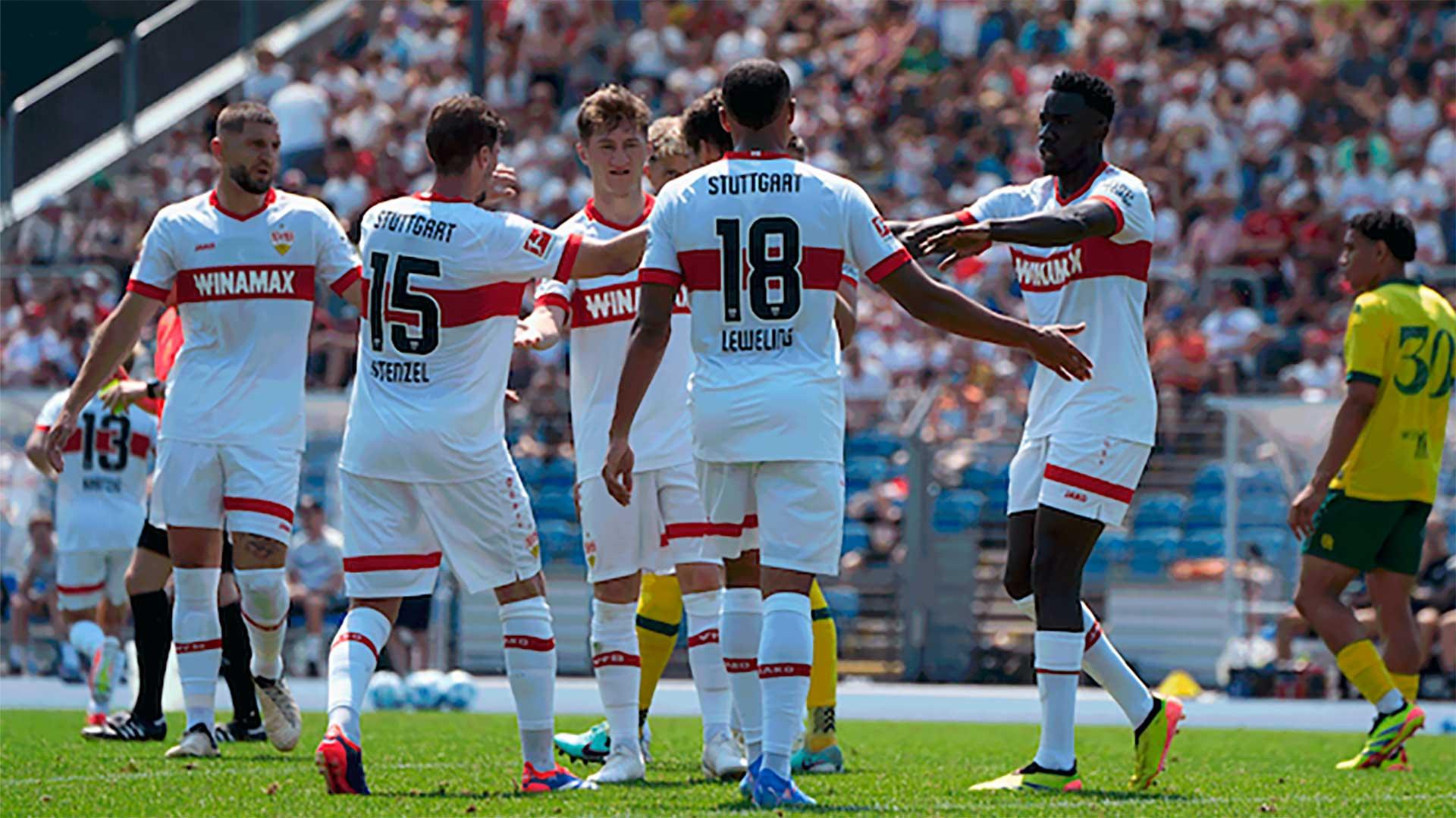
VfB Stuttgart: The Swabian Motor Fuelling German Football
VfB Stuttgart: The Swabian Motor Fuelling German Football
The city known as the "cradle of the automobile" will host a friendly between VfB Stuttgart and Athletic Club
Athletic Club will take on Bundesliga runners-up VfB Stuttgart in a friendly match at MHP Arena on Saturday August 10 at 15:30 CEST.
It will be the third clash between Los Leones and 'Die Schwaben' (The Swabians), with the two having also met in Germany for the 1992/93 and 1995/96 pre-seasons.
Athleticzales looking to attend the match can purchase tickets via this link.
The city of Stuttgart
Stuttgart, capital of the federal state of Baden-Württemberg and the sixth largest city in Germany, is widely recognised as the birthplace of the automotive industry and often called the "cradle of the automobile".
Mercedes-Benz and Porsche have their headquarters in the city and both organisations are offical sponsors of VfB Stuttgart.
Stuttgart is also a key city in the historical, cultural and linguistical region of Swabia (hence the club's nickname), which spans most parts of modern-day Baden-Württemberg and southwest Bavaria. Aside from their distinctive dialect and hearty cuisine, Swabians are known for their work-ethic, meticulousness and innovative spirit.
Previous meetings
This won't be Athletic's first pre-season exhibition against the German outfit. They first met at SSV Ulm 1846's Donaustadion in 1992/93, with Stuttgart winning 1-0.
Three years later, the Germans beat Athletic 3-0 at Nuremburg's Frankestadion in another friendly.
In addition to those clashes, Thomas Hitzlsperger, a Stuttgart legend and member of their last side to win the Bundesliga in 2007, became Athletic's 125th anniversary ambassador for April in recognition of his tireless work in trying to make football more diverse, just and tolerant.
2023/24 Bundesliga runners-up
Sebastian Hoeneß's side have just produced one of their best Bundesliga campaigns ever, finishing second on 73 points - between Bayer Leverkusen and Bayern Munich - and securing a return to Champions League football for the first time since 2009/10.
Their main strikers, Serhou Guirassy, now at Borussia Dortmund, and Deniz Undav, scored a whopping 46 goals between them, with Guinean international Guirassy's 28 strikes in 28 league appearances only second to Harry Kane in all of Europe.
VfB Stuttgart's successes didn't go unnoticed by Germany head coach Julian Nagelsmann, who called up four players to his squad for Euro 2024: defenders Maximilian Mittlestadt and Waldemar Anton, midfielder Chris Fuhrich and forward Deniz Undav.
VfB Stuttgart's history
The Bundesliga outfit traces its origins back to 1893 and its predecessor Stuttgarter FV, initially a rugby club. However, after adding a football section in 1908, Stuttgarter FV merged with FC Krone Cannstatt on 2 April 1912 to form the club we know today, VfB Stuttgart 1893.
In 1933, Stuttgart moved to the Neckarstadion, which after several name changes and refurbishments, is now called the MHP Arena.
Under the Nazi regime, German football was divided in 16 top-level divisions called Gauligas. VfB Stuttgart played in the Württemberg Gauliga and won the division five times before football collapsed due to World War II.
After the war, the Swabians competed in the Oberliga Süd, the league championship set up in the US occupation zone.
It was a succesful period for the club, who quickly established themselves as one of the strongest sides in the tournament, winning the title three times (1946, 1952 and 1954).
After the debacles at the 1958 and 1962 World Cups, the German Football Association decided to professionalise and merged the regional leagues into a single top flight. VfB Stuttgart was one of the 16 clubs that formed the original Bundesliga in Germany.
Following that, the German club continued collect honours. In 1974 they qualified for the UEFA Cup for the first time and in 1983/84 they won the Bundesliga.
Stuttgart have since won the German league title on two more ocassions, in 1991/92 and most recently in 2006/07. They have also lifted the DFB Pokal (German Cup) three times (1953/54, 1957/58 and 1996/97).
On the European front, the Swabians finished runners-up in the 1988/89 UEFA Cup and the 1997/98 UEFA Cup Winners' Cup, while they were Intertoto Cup winners in 2000 and 2002.
Nevertheless, Stuttgart have suffered relegation four times throughout their history, the most recent of which came in 2018/19, when they lost a promotion/relegation play-off against Union Berlin.
A prolific youth academy
They don't only produce top-quality cars in Stuttgart, they also churn out fantastic footballers. According to VfB's website, "more than 100 players formed in the club's youth teams for more than three years are currently competing in Europe's highest professional leagues". This includes the likes of Timo Werner, Joshua Kimmich, Serge Gnabry, Bernd Leno and Antonio Rüdiger.
Besides those academy products, some other recognisable names have pulled on VfB's famous red hoop, such as legendary striker Jürgen Klinsmann, Samy Khedira, Mario Gómez and Giovane Élber, the third highest goalscorer in Bundesliga history.
The Swabians have had two One-Club Men in their history, both goalkeepers, but with very different career paths.
Helmut Roleder made 347 appearances and won the 1983/84 Bundesliga title between 1972 and 1986, while Eberhard Trautner spent 15 years at the club from 1986 until 2001, but only made 32 appearances.
MHP Arena, Euro 2024 venue
The 60,000-seater stadium played host to six matches during this summer's European Championships: Slovenia v Denmark, Germany v Hungary, Scotland v Hungary and Ukraine v Belgium in the group stages, plus the quarter-final between Spain and Germany.
VfB describes itself as "a flagship with massive power of identification and an integral element in the everyday lives of many people" in the Baden-Württemberg state. Nowhere is this more evident than in the 'Cannstatter Kurve', the MHP Arena's passionate standing section, where flares, tifos and flags are always present.
